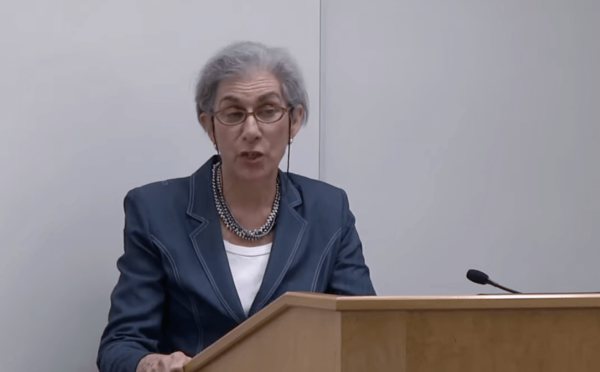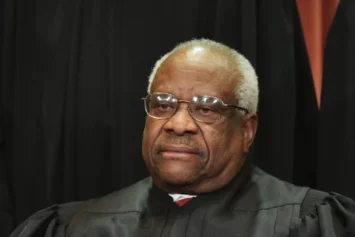An Asian student is standing up for a University of Pennsylvania law professor who faces losing her tenured position due to racist viewpoints that sparked massive protests on the Ivy League campus in recent weeks.
Despite her growing reputation for sparking racial controversies by suggesting the superiority of white culture, professor Amy Wax has found an unexpected advocate in Charlie Cheon — a third-year law student who wrote a letter to school administrators late last month expressing support for his beleaguered teacher.
It remains uncertain, however, if Cheon was aware of Wax’s controversial statements, including the assertion that the United States would be “better off with fewer Asians” and her remarks that “Blacks” and Asians are resentful of “Western peoples’ outsized achievements.”

For now, Wax — who has taught at Penn Law since 2001 — remains on the university staff despite growing calls for her to resign due to racist comments and writings that have stirred anger among students and a wide range of cultural and social justice advocates during her long tenure.
Previously, the National Black Law Students Association, the National Asian Pacific American Law Student Association, and the North American South Asian Law Students Association released a letter in April 2022 calling for Wax to be ousted from the campus and barred from talking to students after she made openly made racist remarks in and outside a lecture hall.
At the time, the Penn Law School had already faced several years of blowback due to the professor’s remarks. The school has also disciplined Wax but has also taken more than 20 months to review a litany of claims against the professor while she continues her offensive rants in the classroom.
Previously, a group of student leaders called for Wax to be suspended until her grade books from the past 21 years could be reviewed, but school officials never responded to the demand.
In the latest episode, the university said it had initiated a legal process to fire Wax for alleged disparaging statements she’s made during her time at Penn, which recently prompted the professor to launch a legal defense fund that faces accusations of promoting itself as a tax-deductible charity, potentially violating federal tax laws.
Wax ignited the most recent firestorm when she twice invited white supremacist Jared Taylor to speak in front of her Conservative Legal Thoughts class, adding fuel to the broader uproar over her teaching methods while also sparking massive campus protests and complaints to academic administrators.
Many voices in the broader academic community have also expressed concerns that Wax was attempting to whitewash America’s history of racism.
Not everyone was on board with the backlash, however, as Cheon filed a complaint with Penn administrators about the escalating tempest.
“I write to you to express my sincerest displeasure with regards to the way some students are handling the invitation of a guest by Professor Wax,” Cheon, who is Asian, says in a letter posted to his YouTube channel in late November. “I was quite incensed to see flyers posted all across the school smearing Professor Wax’s character. In my opinion, this — along with the fact that some of her students in the Conservative Legal Thoughts class were harassed (boo-ed and hissed at) — shows an effort to intimidate, indicating a lack of respect for civil discourse.”
Cheon’s YouTube channel declares he is “a law student living in Philly” while also emphasizing he is strongly opinionated about political concerns.
“I like to share my opinions on matters important to me, and I hope you get to hear them. No hard feelings if you disagree,” he proclaims in his profile statement.
In late November, Cheon invited his 136,000 YouTube followers to “Read my letter to the Dean of my law school regarding an incident that happened today with the woke mob” before adding, “I really cannot stand them” — a reference to those who were railing against the professor’s controversial viewpoints.
The letter raises specific concerns regarding how some students were reacting to the controversy involving Wax, with Cheon citing major discord in Wax’s classes, including the distribution of racist propaganda and an overall atmosphere of harassment during class time.
Cheon’s statement also attempts to outline the troublesome aspects of the Wax situation that was disrupting student life as the fall semester neared the Christmas break.
Cheon kicks off the complaint by citing his general displeasure with students who protested following Wax’s apparent embrace of Taylor despite his position as an avowed white nationalist.
In the letter, Cheon also expresses concerns about the principles of free speech and complains that conservative students might feel restricted from expressing genuine viewpoints in such a politically charged environment where people wear their emotions on their sleeves.
He also calls on college leaders to communicate to protesters that dissenting views are valid and not inherently harmful or violent. He also casts doubt on the self-righteous mindset of some protesters and urges the administration to consider this perspective in their decision to deal with Wax.
The letter then makes an awkward attempt to support the protesters’ right to free speech and peaceful protest.
“To be clear, I understand that there are principles of free speech at play here,” Cheon says. “Students have a right to protest events which are not to their liking. I am not suggesting that the administration suppress their ability to share their viewpoints.”


